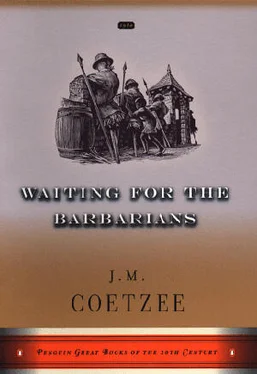* *
We rest on the eighth day, for the horses are now in a truly pitiable state. They chew hungrily at the sapless fibre of the dead reed-stalks.
They bloat their bellies with water and break wind massively. We have fed them the last of the linseed and even a little of our bread. Unless we find grazing in a day or two they will perish.
* *
We leave our well behind us, and the mound of earth we dug, to press on northwards. All of us walk except the girl. We have abandoned whatever we can afford to lighten the horses' burden; but since we cannot survive without fire they must still carry bulky loads of wood.
"When will we see the mountains?" I ask our guide.
"One day. Two days. It is hard to say. I have not travelled these parts before." He has hunted along the eastern shore of the lake and the periphery of the desert without having reason to cross it. I wait, giving him every chance to speak his mind, but he seems unperturbed, he does not believe we are in danger. "Perhaps two days before we see the mountains, then another day's march before we reach them." He screws up his eyes, peering into the brown haze that veils the horizon. He does not ask what we will do when we get to the mountains.
We reach the end of this flat pebbly waste and ascend a series of rocky ridges to a low plateau, where we begin to meet with hummocks of withered winter grass. The animals tear savagely at them. It is a great relief to see them eat.
I wake up with a start in the middle of the night, filled with a dire sense that something is wrong. The girl sits up beside me: "What is it?" she says.
"Listen. The wind has stopped."
Barefoot, wrapped in a fur, she crawls after me out of the tent. It is snowing gently. The earth lies white on every side beneath a hazy full moon. I help her to her feet and stand holding her, staring up into the void from which the snowflakes descend, in a silence that is palpable after a week of wind beating ceaselessly in our ears. The men from the second tent join us. We smile foolishly at each other. "Spring snow," I say, "the last snow of the year." They nod. A horse shaking itself off nearby startles us.
In the snowbound warmth of the tent I make love to her again. She is passive, accommodating herself to me. When we begin I am sure that the time is right; I embrace her in the most intense pleasure and pride of life; but halfway through I seem to lose touch with her, and the act peters out vacantly. My intuitions are clearly fallible. Still, my heart continues its affectionate glow towards this girl who so briskly falls asleep in the crook of my arm. There will be another time, and if not, I do not think I mind.
* *
A voice is calling through the slit of the tent-mouth: "Sir, you must wake up!"
I am dazedly aware of having overslept. It is the stillness, I think to myself: it is as if we are becalmed in the stillness.
I emerge from the tent into daylight. "Look, sir!" says the man who woke me, pointing north-east. "Bad weather on the way!"
Rolling down upon us over the snowy plain is a gigantic black wave. It is still miles away but visibly devouring the earth in its approach. Its crest is lost in the murky clouds. "A storm!" I shout. I have never seen anything so frightening. The men hurry to take down their tent. "Bring the horses in, tether them here in the centre!" The first gusts are already reaching us, the snow begins to eddy and fly.
The girl is beside me on her sticks. "Can you see it?" I say. She peers in her crooked way and nods. The men set to work striking the second tent. "The snow was not a good sign after all!" She does not reply. Though I know I should be helping, I cannot tear my eyes from the great black wall roaring down upon us with the speed of a galloping horse. The wind rises, rocking us on our feet; the familiar howl is in our ears again.
I bestir myself. "Quick, quick!" I call out, clapping my hands. One man is on his knees folding the tent-cloths, rolling the felts, stowing the bedclothes; the other two are bringing the horses in. "Sit down!" I shout to the girl, and scramble to help with the packing. The storm-wall is not black any more but a chaos of whirling sand and snow and dust. Then all at once the wind rises to a scream, my cap is whirled from my head, and the storm hits us. I am knocked flat on my back: not by the wind but by a horse that breaks free and blunders about, ears flat, eyes rolling. "Catch it!" I shout. My words are nothing but a whisper, I cannot hear them myself. The horse vanishes from sight like a phantom. At the same instant the tent is whirled high into the sky. I hurl myself upon the bundled felts, holding them down, groaning with fury at myself. Then on hands and feet, dragging the felts, I inch my way back towards the girl. It is like crawling against running water. My eyes, my nose, my mouth are already stopped with sand, I heave to breathe.
The girl stands with her arms stretched like wings over the necks of two horses. She seems to be talking to them: though their eyeballs glare, they are still.
"Our tent is gone!" I shout in her ear, waving an arm toward the sky. She turns: beneath the cap her face is wrapped in a black scarf; even her eyes are covered. "Tent is gone!" I shout again. She nods.
For five hours we huddle behind the piled firewood and the horses while the wind lashes us with snow, ice, rain, sand, grit. We ache with cold to our very bones. The flanks of the horses, turned to the wind, are caked with ice. We press together, man and beast, sharing our warmth, trying to endure.
Then at midday the wind drops as suddenly as if a gate has been closed somewhere. Our ears ring in the unfamiliar quiet. We ought to move our numbed limbs, clean ourselves off, load the animals, anything to make the blood run in our veins, but all we want is to lie a little longer in our nest. A sinister lethargy! My voice rasps from my throat: "Come, men, let us load."
Humps in the sand show where our discarded baggage lies buried. We search downwind but find no sign of the lost tent. We help the creaking horses up and load them. The cold of the tempest is as nothing to the cold that succeeds it, settling like a pall of ice upon us. Our breath turns to rime, we shiver in our boots. After three unsteady seesawing steps the front horse crumples on its hindquarters. We throw aside the firewood it carries, lift it to its feet with a pole, whip it on. I curse myself, not for the first time, for setting out on a hard journey with an unsure guide in a treacherous season.
* *
The tenth day: warmer air, clearer skies, a gentler wind. We are plodding on across the flatlands when our guide shouts and points. "The mountains!" I think, and my heart leaps. But it is not the mountains he sees. The specks he points to in the distance are men, men on horseback: who but barbarians! I turn to the girl, whose shambling mount I lead. "We are nearly there," I say. "There are people ahead, we will soon know who they are." The oppression of the past days lifts from my shoulders. Moving to the front, quickening my pace, I turn our march towards the three tiny figures in the distance.
We push on towards them for half an hour before we realize that we are getting no closer. As we move they move too. "They are ignoring us," I think, and consider lighting a fire. But when I call a halt the three specks seem to halt too; when we resume our march they begin to move. "Are they reflections of us, is this a trick of the light?" I wonder. We cannot close the gap. How long have they been dogging us? Or do they think we are dogging them?
"Stop, there is no point in chasing them," I say to the men. "Let us see if they will meet one of us alone." So I mount the girl's horse and ride out alone towards the strangers. For a short while they seem to remain still, watching and waiting. Then they begin to recede, shimmering on the edge of the dust-haze. Though I urge it on, my horse is too weak to raise more than a shambling trot. I give up the chase, dismount, and wait for my companions to reach me.
Читать дальше












